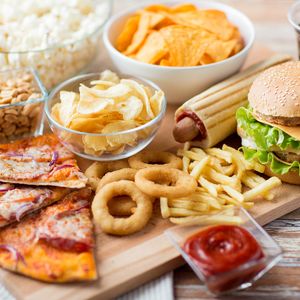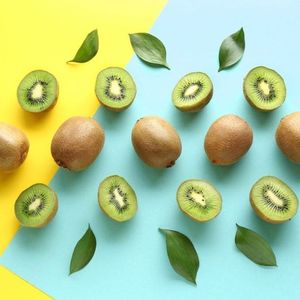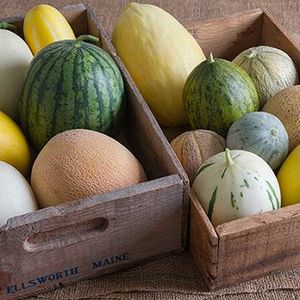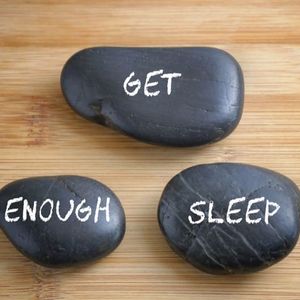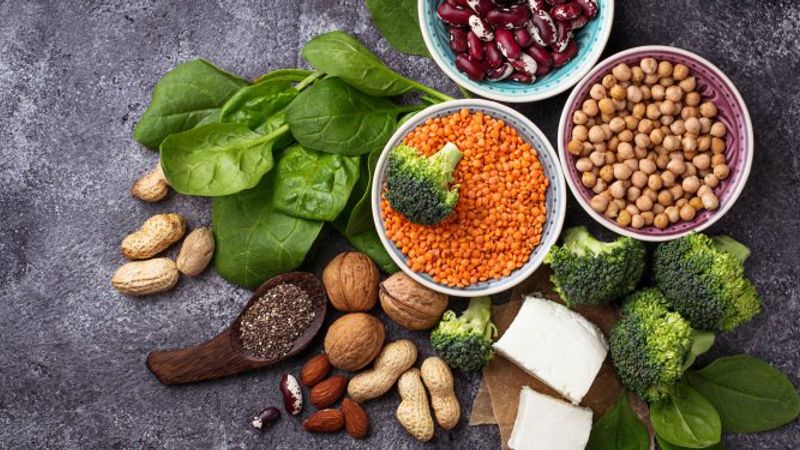

Our Review Process
Our articles undergo extensive medical review by board-certified practitioners to confirm that all factual inferences with respect to medical conditions, symptoms, treatments, and protocols are legitimate, canonical, and adhere to current guidelines and the latest discoveries. Read more.
Our Editorial Team
Shifa Fatima, MSc.
Author
Dr. Apoorva T, MHM.
MEDICAL ADVISOR
Protein From A Vegetarian Diet
There is a very common misconception that protein-rich foods are primarily non-vegetarian. This could be because the word protein is usually associated with eggs, steak, fish, chicken, etc. No one really talks about the vegetarian options for proteins. There is a concern associated with the vegetarian diet and how can vegetarians get protein meeting the required amount of protein required for the body. Experts, however, shun these myths away by talking about how a well-planned diet with vegetarian food can provide the necessary proteins and nutrients. Plant foods contain a significant amount of protein. Therefore, it is now important to realize and acknowledge that protein just does not come from animal-based foods.
As a vegetarian, having a chat about your health and dietary preferences is not always fruitful; pun intended. No matter who you talk to - friends, family, colleagues; the most common question that comes up is -
But where do you get your proteins?
The answer may surprise you! Vegetarians can get their proteins from several sources and without any difficulties. The trick is to know how much protein you need on a daily basis and what are the best sources to get them. Also know about curd with sugar benefits

Table of Contents
So, how much Protein does a person need?
How can a vegetarian get protein in their diet? Before understanding the amount and level of protein intake for a person, it would be vital to understand why this particular micronutrient is for the human body. It is an important dietary requirement for the body as it is the building block that any person requires for sufficient growth. It promotes muscle strength and weight loss. It is also one of the most important nutrients that help build and maintain the tissues. Even during injuries, proteins are what help rebuild the skin and the tissue. It also helps in the digestion process. Overall, it is one of the most important factors that promote and maintain a healthy immune system. They help to form the antibodies that then work to fight against the unhealthy viruses and bacteria that enter the body.
According to the National Institute of Nutrition, the Estimated Average Requirement is 0.6g/kg of body weight, while the Recommended Dietary Allowance is around 0.8g/kg of body weight for adult Indians. However, it varies with factors such as age, comorbidities, physical activity, and physiological changes.

Is it Difficult for Vegetarians to meet Protein Requirement?
Not at All ! But it is important to identify the best natural food sources from which you can gain the most benefit. Most plant-based foods like whole grains, whole pulses, dals, nuts, and seeds are excellent sources of protein, while animal-based sources include milk and its substitutes.
Even if you’re not a total vegetarian, it’s still a great idea to designate one or two days per week where you don’t include meat in your meals because regardless of your dietary preferences, lentils and beans are a real powerhouse of nutrition for everyone. There are plenty of easy ways to incorporate protein in your vegetarian diet. Here’s a list of the best protein rich foods for vegetarians and protein sources and how to optimize their benefits. Know about Indian breakfast for diabetes .
Pumpkin Seeds
- Protein Content : 100 g of pumpkin seeds contains 30 g of protein
- Benefits : They are a natural source of tryptophan, which is a sleep hormone precursor
- Daily Quantity : Around 1.5 to 2 tbsp.
- Tip : Add pumpkin seeds to your salad or have it as a mid-day or an evening snack
Adding pumpkin seeds to the diet would be great as it is a good source of tryptophan that is a precursor to the sleep hormone. They are also rich in Vitamin K, phosphorus, and manganese. To consume, you can add these seeds to any kind of salad. They can also be eaten raw as a snack. Roasted pumpkin seeds in olive oil with salt and pepper also give a great taste.
Chickpeas (Kabuli Chana)
- Protein Content : 100 g of boiled chickpeas contains around 9 g of protein
- Benefits : The protein & fiber content increases satiety levels and leaves you feeling fuller for longer
- Daily Quantity : 100 g or 1/4th your major meal of the day
- Tip : Boil chickpeas, add raw onion, tomatoes, and season it with grated coconut and a garnish (tadka).
Considered one of the tastiest food items, chickpeas are also supremely healthy. They are high in protein and fiber and therefore are great meals to keep you feeling full for longer periods of time. Indian households do not need any tips to cook and consume chickpeas. The best way would be to boil them and cook them with a tomato and onion gravy to eat with parathas. Another way would be to simply boil them, add a bit of salt and spices, and consume them as a salad.
Chia Seeds
- Protein Content : 100 g of chia seeds contains around 17 g of protein
- Benefits : It’s a rich source of magnesium which reduces the risk of heart problems
- Daily Quantity : Around 1.5 to 2 tbsp.
- Tip : Soak chia seeds in water overnight and add it to your fruit salad or overnight oats
There are several benefits to chia seeds, they, of course, are a good source of protein and also provide omega-3, iron, calcium, and magnesium to the body. These help to reduce the risk of cardiovascular diseases. Chia seeds can be consumed as raw toppings for delicious yogurt meals or smoothie bowls. They can also be used for baking goods. Add them to puddings and jams and make them even tastier.
Soybean
- Protein Content : 100 g of boiled soybean contains 18 g of protein
- Benefits : Aids Weight Loss as it is low in carbs & fats, while being rich in fiber & other micronutrients
- Daily Quantity : 1/4th of your major meal
- Tip : Make a curry and have it with Roti
Considered one of the most important beans in the world, soybean provides several health benefits. Naturally, they are high in protein but are also rich in carbs and fat. Vitamins, minerals, and other nutrients are also high in these beans. Soybeans are known to reduce the symptoms of menopause, prostate, and breast cancer. Soybeans can be made into a gravy vegetable or even a dry vegetable with a few tomatoes. Consume it with roti.
Almonds
- Protein Content : 100 g of almonds contains around 21 g of protein
- Benefits : They are rich in Vitamin E, which boosts memory and prevents cognitive decline
- Daily Quantity : 10-12 pieces
- Tip : Add almonds to your salad, make almond milk, have it as a mid-day snack or add it to your smoothie
The many health benefits of almonds need not be told. They reduce bad cholesterol and are rich in vitamin E, magnesium, and potassium. They are responsible for a free and healthy flow of oxygen in the blood. Almonds also benefit the bones and make them stronger. They are also great for boosting brain function and memory. There can be several different ways to consume almonds – as a dry fruit, roasted or salted, grated within sheera or kheer, chopped into a dark chocolate mold, powered into milk, almond flour, etc.
Kidney Beans or Rajma
- Protein Content : 100 g of boiled rajma has around 9 g of protein
- Benefits : Releases carbohydrates slowly & does not cause a spike in sugar levels
- Daily Quantity : 1/4th of your major meal
- Tip : Make a curry and have it with Roti
Again, one of the most popular snacks and food categories in India, rajma is one of the most looked-forward-to meals. It has a very low GI which results in the slow release of carbs, thus not spiking the sugar levels. It helps in the process of digestion and promotes weight loss. It is also a rich source of minerals. Have rajma in the form of a gravy sabzi and you can pair it with rice or roti.
Dairy Products
- Protein Content : 100 g of Greek yogurt contains 10 g of protein. 100 ml of milk contains around 3.4 g of protein
- Benefits : Yogurt is rich in probiotics, and contains gut-friendly bacteria such as lactobacillus
- Daily Quantity : 400-500 ml (overall dairy)
- Tip : Choose Greek yoghurt as a healthy replacement for high-calorie fats like Oil, Butter, Mayonnaise, Buttermilk and Cheese
Dairy products are not only refreshing and tasty but also provide a good level of water intake via food into the body. They help to replenish the body and are also high in protein. These also have essential bacteria that are gut-friendly. The probiotic nature of dairy products is also beneficial. A healthy blood pressure, brain development, immune functioning, etc is also achieved with the consumption. Have dairy products in the form of milk, buttermilk, yogurt, non-fat/ low sugar Greek yogurt, probiotic curd, etc. Also know about diabetes diet chart pdf
Tips for Better Protein Absorption
1. Eat more Raw Foods
- Proteins are big molecules made of amino acids. Once consumed, your stomach releases protein-specific enzymes to break these down and start the process of digestion.
- The best way to digest proteins is to have an enzyme rich meal and increase consumption of vegetables and raw fruits
- Since cooking food destroys living enzymes, avoid over-cooking green vegetables and choose recipes that include a good amount of raw ingredients.
2. Chew your Food Well
- This simple act can improve your digestion and help your body process the proteins you’re consuming.
- The more your food is broken down as it enters the stomach, the fewer enzymes are needed to absorb its nutrients.
3. Add Spices
- Use spices while cooking food to aid digestion. Jeera, Ajwain, Hing, and ginger-garlic paste in your protein rich meals will reduce bloating and boost digestion.
4. Other Easy Ways
- Add whole pulses, sprouts, nuts and seeds in your meals and salads
- Make lentil dosas instead of the regular white rice, or make rajma and sweet potato cutlet instead of potato cutlets.
- Try hung curd or whole-pulse hummus as a dip with your vegetables.
- Add milk (regular, almond, or oat) and soaked nuts like almonds, cashews, walnuts to your fruit smoothies

Bottom Line
When compared to animal protein, plant-protein has a lot more benefits - it is more easily digested, generally less acidic and comes with added components like fibre, healthier fats and other nutrients. Since plant based foods are the only sources of dietary fibre, eating more of it helps move food through your intestines at a more rapid rate and promotes a healthier colon. Most importantly, plant-proteins have a positive impact on your body and sense of well being. So the next time someone questions your protein intake, dazzle them with the endless possibilities available and all the rewards you reap from them. Also read about is carrot good for diabetes.
FAQs
1. How can vegetarians get 100g protein a day?
There is a concern in vegetarians that how to get protein as a vegetaria and what are the protein rich vegetarian food with the help of lentils, pulses, paneer, dairy, etc a vegetarian can incorporate about 100gms of protein in their diet. Use a combination of these food categories in the diet plan to mix it up a little.
2. Which Vegetarian foods have pure protein?
There are several food options like – seitan, tofu, lentils, beans, paneer, etc that contain pure protein and can help a vegetarian increase their protein intake per day.
References
- https://www.downtoearth.org/articles/2010-03/1374/do-vegetarians-get-enough-protein
Disclaimer
This website's content is provided only for educational reasons and is not meant to be a replacement for professional medical advice. Due to individual differences, the reader should contact their physician to decide whether the material is applicable to their case.
More by Rekha Prabhu
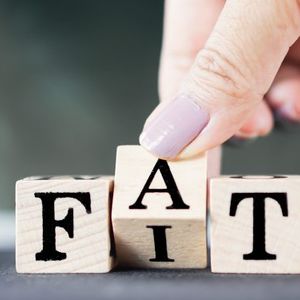
The Good, Bad, the Healthy and Everything You Need To Know About Fats

Understanding Food Labels: How to Read Food Labels


